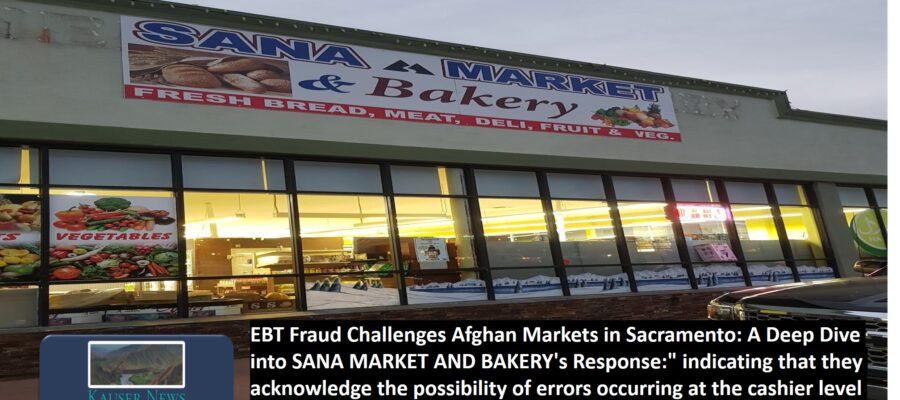The issue of Electronic Benefit Transfer (EBT) fraud has become a concerning problem in Sacramento, particularly within Afghan markets and stores. Kauser News Agency, after receiving more than 165 complaints from Afghan refugees, decided to investigate 35 Afghan stores suspected of committing EBT fraud. Among these, SANA MARKET AND BAKERY emerged as a focal point, and a conversation with the owner, Engineer Hanyeid, shed light on the market’s stance on the allegations. In this comprehensive analysis, we delve into the details of the EBT fraud issue in Sacramento, examining the challenges faced by Afghan markets and SANA MARKET AND BAKERY’s response.
Background of EBT Fraud in Sacramento:
Electronic Benefit Transfer (EBT) is a system that allows recipients of government assistance programs, such as the Supplemental Nutrition Assistance Program (SNAP) or Temporary Assistance for Needy Families (TANF), to access their benefits using a debit card.
fraudulent activities have plagued the EBT system, with some individuals and businesses exploiting loopholes for personal gain.
In Sacramento, Afghan markets and stores have come under scrutiny for their alleged involvement in EBT fraud. Reports suggest that some of these stores are selling non-qualifying items, such as house tools and cooked food, through EBT transactions. This practice not only violates the rules governing EBT usage but also undermines the integrity of the assistance programs designed to support those in need.
Kauser News Agency took it upon themselves to investigate the widespread complaints received from Afghan refugees in Sacramento. The focus was on 35 Afghan stores suspected of engaging in EBT fraud. One of these stores, SANA MARKET AND BAKERY, stood out as a key player in the unfolding scenario.
On February 26, 2023, at 11:16 AM, Kauser News Agency engaged in a phone conversation with Engineer Hanyeid, the owner of SANA MARKET AND BAKERY. During the discussion, Hanyeid provided insights into the market’s stance on the EBT fraud allegations.
According to Hanyeid, SANA MARKET AND BAKERY categorically rejects the claims made against them. He stated that the market is operating in compliance with California law and argued that the allegations might be part of a larger conspiracy to tarnish their reputation. Notably, he mentioned, “Maybe our chaser sells some item in EBT which should be sold on EBT,” indicating that they acknowledge the possibility of errors occurring at the cashier level rather than a systemic problem within the market’’.
Hanyeid went on to express concerns about competitors attempting to destroy SANA MARKET AND BAKERY’s reputation in Sacramento. He hinted at the possibility of a calculated effort to harm the market’s image, emphasizing the competitive dynamics at play among Afghan markets in the region.
The allegations of EBT fraud in Afghan stores in Sacramento involve the sale of non-qualifying items through EBT transactions. Witnesses claim that some stores are selling house tools and prepared food, disguising these transactions as grocery purchases during the cash register process.
One witness, speaking on condition of anonymity, revealed that this fraudulent activity has been ongoing since 2021. The witness attested to observing several stores engaging in the practice of selling items not permitted under EBT guidelines. These items are then recorded as groceries during the transaction, misleading both the customers and the authorities.
EBT fraud raises significant legal and ethical concerns, particularly when it involves businesses that play a crucial role in providing essential goods to the community. If proven true, the allegations against Afghan markets in Sacramento could lead to severe consequences, including legal repercussions, fines, and damage to the reputation of these businesses.
Engaging Said, in EBT fraud not only violates the rules governing government assistance programs but also undermines the integrity of the entire system. These programs are designed to support vulnerable populations, and any abuse of the system compromises the well-being of those who genuinely rely on these benefits.
Engineer Hanyeid’s defense of SANA MARKET AND BAKERY centers around adherence to California law and the suggestion that any discrepancies may be attributed to individual cashier errors. The market’s denial of the allegations and the assertion that competitors may be involved in a smear campaign raise questions about the motivations behind the accusations.
The mention of competitors attempting to harm SANA MARKET AND BAKERY’s reputation sheds light on the competitive dynamics within the Afghan market sector in Sacramento. Business rivalries are not uncommon, and allegations of misconduct, if unfounded, can severely impact a business’s standing in the community.
It is essential to consider whether the accusations against SANA MARKET AND BAKERY are rooted in genuine concerns about EBT fraud or if they are part of a larger strategy to gain a competitive advantage. Understanding the broader context of market competition is crucial in evaluating the credibility of the claims made against the business.
EBT fraud allegations against Afghan markets have the potential to erode trust within the community. Businesses like SANA MARKET AND BAKERY play a vital role in providing essential goods to residents, especially those who rely on government assistance programs. If these businesses are found guilty of fraudulent activities, it may lead to a loss of trust among customers and adversely affect the community’s access to necessary resources.
It is crucial to assess the impact of such allegations on the community, considering the potential consequences for residents who depend on these markets for their daily needs. Rebuilding trust, if the allegations are proven false, becomes imperative for businesses like SANA MARKET AND BAKERY to continue serving their communities effectively.
The issue of EBT fraud necessitates a closer look at the regulatory oversight and enforcement mechanisms in place. If Afghan markets in Sacramento are indeed engaging in fraudulent activities, it raises questions about the effectiveness of monitoring and enforcement by relevant authorities.
Government agencies responsible for overseeing EBT transactions must ensure that businesses are held accountable for any violations. Strengthening regulatory frameworks and enhancing enforcement measures are essential to prevent and address instances of EBT fraud, safeguarding the integrity of assistance programs.





